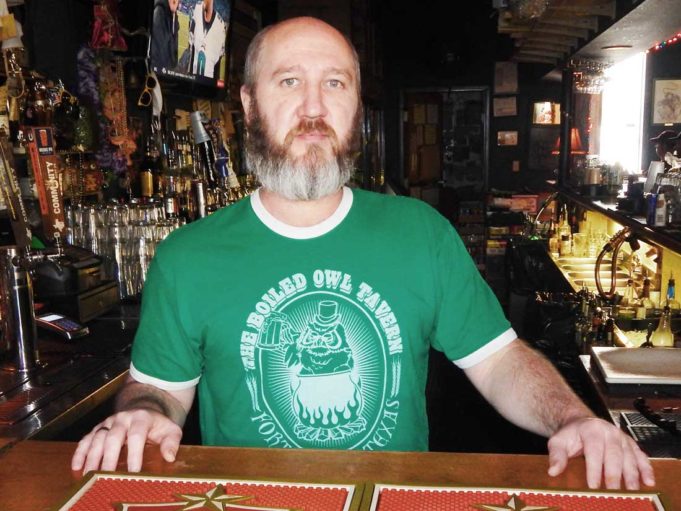There will be happy people and unhappy people beginning March 12, 2018, when Stage Two of Fort Worth’s nonsmoking ordinance goes into effect. Passed just last week, the new stage means that bingo parlors and the remaining bars that allow smoking — along with some smoke shops and cigar lounges — will be required to go smoke free. The city’s Department of Code Compliance estimates that about 275 small businesses will be impacted.
The expansion of the 2007 ordinance, which cut out smoking in all restaurants and most bars and limited the number of rooms that a hotel or motel could have available to smokers, is drawing mixed reviews. For many tobacco enthusiasts, including this reporter, a bar without lingering, toxic cigarette smoke simply isn’t a suitable establishment. Who wants an alcoholic drink without a smoke or six? From my experience, even former and nonsmokers beg cigarettes off their friends once they get into their cups.
A recent visit to The Boiled Owl Tavern, one of two bars on West Magnolia Avenue that still allows smoking, provided me with some surprising answers from one of the bartenders. The Boiled Owl is a beautiful place: ashtrays at every seat at the bar, blue smoke hovering in the air on chilly afternoons. Sure, there are plenty of interesting things hanging on the walls, an antique pool table, and other cool stuff. But, for my money, it’s the lingering smoke and tobacco smell that provides its beautiful character.
The bartender expressed similar thoughts, to a point.
“I’m a regular smoker; I love smoking,” said Cody, who has tended bar there for four years. “And politically I don’t like the idea that the city can tell you whether or not you can have smoking in your own place. That is really overreaching. But on a personal note, I’m glad we are going to non-smoking because the smoke gets really thick in here, even with smoke eaters.”
How does he think his clients will feel? Will the place lose business?
“Not everyone is happy about it, of course,” Cody said. “But most of the clients have said they’ll deal with it.”
And those clients that the bar does lose “might be more than made up by new clients who have never had a drink at the place because of the smoke,” he said.
Down the street at another watering hole, several smoking clients felt that they could deal with the change because, as one put it, “You won’t be able to smoke in any bar.”
A young woman who overheard me asking questions leaned into the conversation and added, “Every time I’m here, I have to take my clothes to a dry cleaner” afterward, she said. “I can’t wait to come here and only smell like beer when I go home.”
Many of the bars on Magnolia boast large patios. Some of those outdoor tables are more than the required 20 feet from the entrance that the ordinance demands, meaning there will be some seated smoking available outside. When it’s cold, most bars already use heaters outdoors, so their smoking clientele should be fine.
Not everyone is so lucky.
“Lord, if this had happened in 1982, when we first opened for business, we’d have been out of business,” said Beth Bostillo, one of five owners of two bingo parlors in Fort Worth.
Bostillo and her partners own Five Star Bingo on Daggett Avenue, which operates as a daytime parlor, and Lone Star Bingo on Blue Smoke Court North, which opens at night.
“When we first opened in 1982, I would say that at least 80 percent of our players were smokers,” Bostillo said. “But over the years, that changed. We’ve got two rooms in each hall and these days, our nonsmoking bingo rooms fill up faster than our smoking rooms.”
She isn’t a fan of being told what she can do in her own place but says she can’t fight it, so she will comply and do the best she can.
“I’ll make accommodations for the smokers with places outside where they can have a cigarette,” she said. “We’re already trying to figure out where to place tables and heaters and such, and we plan on having at least one 10-minute break in each game to give those smokers a chance to enjoy themselves without being rushed.”
What impact will the changes have on her clientele and businesses longterm?
“I think we will lose clients, at least at first, but once they realize that they can’t smoke in any bingo parlor, and once they see that we are going to accommodate them, I think they’ll come back,” she said. “I think we’ll be fine.”
One of the people most upset with the new ordinance is not going to be affected by it at all. Perry Tong is the owner of Pop’s Safari Room, a cigar lounge on Morton Street in the West 7th corridor. While the new ordinance makes demands on cigar lounges, smoking will continue to be permitted in those lounges that produce at least 30 percent of their annual income from onsite consumption of cigars and cigar accessories. Tong does about double that percentage of annual revenue.
“I think the whole thing is just a waste of time,” he said. “There ought to be a ban on banning things. The city council is just trying to make their jobs look important by doing something.”
Tong was peripherally involved in crafting the 2007 ordinance by voicing his ideas at city council meetings on the issue. The initial ordinance was “well thought out, well crafted,” he said. “We got smoke out of places where food is served and where families go. But they, the council, can’t stop. They have to go to the next step.”
Diane Covey, public information officer for Code Compliance, said the first step the city is taking is having health inspectors meet with business owners to make certain they understand the new ordinance.
“Once it goes into effect, the city is not going to aggressively pursue violators,” she said. “It’s a complaint-driven ordinance. If a complaint is received, consumer health inspectors will respond with an onsite visit. If the complaint proves out, the inspector will write a notice of violation, which is a warning.”
Additional complaints will result in citations being issued and fines levied. Covey did not know what the fines would be or whether they would escalate in cost after multiple citations.
Years ago, in my home state of New York, when the nonsmoking ban first hit the bars, the price of the ticket remained the same no matter how many were issued. Some owners decided they’d rather pay the hundred bucks a night than lose a grand in business. Soon, the city changed the rules to get everyone on board.
I asked Covey about some of Fort Worth’s neighborhood bars where nearly all the customers smoke. Those sorts of places might never have a complaint lodged against them. And if they don’t, and no inspectors show up, they could just keep on allowing smoking.
“I suppose that could happen,” she said. “We’ll just have to wait to see how it plays out.”












